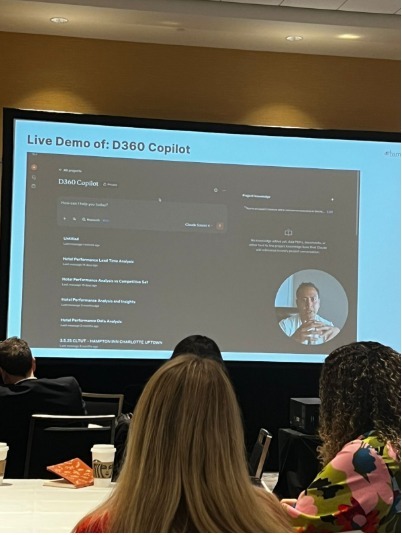By Gabriela Otto, President of HSMAI Brazil and Latam, directly from Indianapolis, USA, at HSMAI Commercial Strategy Week 2025
While the use of AI in hospitality still seems like a murky topic for some leaders, the panel “AI in Action: Transforming Hospitality Workflows for Maximum Productivity,” hosted by John Jimenez, VP of E-commerce & Revenue at Noble Investment Group, demonstrated that for those who have already incorporated AI into their workflows, the results are concrete and measurable, and not simply a fad or superficial automation.
Responsible for more than 60 hotels in the US, Jimenez presented a very clear framework for how to intelligently apply AI in everyday operations, focusing not only on content generation but also on increasing productivity in critical functions such as Revenue Management, BI, and e-commerce.
As he emphasized, "It's not about replacing people, but rather allowing teams to focus on what truly generates value, automating repetitive processes and gaining agility in decision-making."
In other words, AI doesn't replace equipment; it multiplies people's potential. As long as it's used in an integrated and strategic way.
Key insights from the talk:
AI as a driver of operational productivity:
• Implementation of AI to eliminate rework and manual tasks, reducing analysis and reporting processes from 12 hours to 2 hours;
• Example: Cursor AI consolidating more than 45 reports into actionable dashboards for business leadership.
Tools already in use:
• Perplexity AI → market analysis and competitive intelligence;
• ChatGPT / Claude → generation of reports and summaries for executives;
• AI for automated analysis of 5,700 guest reviews, converting feedback into investment plans and operational improvements.
In addition to well-defined frameworks, the panel presented a practical example that caught attention: the use of Copilot integrated with Demand 360 (a demand platform developed by Amadeus).
NoteCopilot is Microsoft's name for its "AI layer" built into Office tools and other platforms (such as Demand 360, Salesforce, Dynamics, etc.). Copilot is an AI that acts as a "digital assistant" within software.
With AI connected directly to D360, Revenue Management teams can generate automated insights, pacing reports, and demand scenarios much more quickly, without the need to export spreadsheets or manually cross-reference data.
The direct impact? Less time wasted on operational tasks and more focus on strategic pricing and channel mix decisions.
Tools like this demonstrate that AI, when properly integrated, is not just for marketing or content, but a true ally of the Revenue Manager to accelerate business intelligence.

Integration framework (logical and practical structure to know how and where AI should enter the processes and generate the greatest impact on your hotel):
• Automation of data analysis;
• Insights for capex and operations;
• Support for strategic pricing and distribution decision-making.
How to train teams:
• Training in prompt engineering (teach the team to build smart questions and commands for the AI);
• Development of custom agents Task-specific AI (custom versions of AI, programmed for specific hotel tasks).
The Latin American market is still in its early stages.
Today, very few hotels and groups in the country apply AI in an integrated way to revenue, e-commerce, and business intelligence. And this opens up a huge opportunity:
• Immediate productivity gains — essential in a scenario where our teams operate with increasingly reduced structures;
• Greater precision in decision-making, especially in dynamic pricing and investment allocation;
• Competitive advantage for those who manage to structure their data and train their teams before this becomes the new “market minimum.”
AI applied to hospitality is no longer a futuristic topic.
It is already redesigning how we operate and, crucially, how we make decisions.
The question that remains for our leaders in Latin America is:
Who will take the lead and transform AI into a real competitive advantage, and who will wait until it becomes just another mandatory cost?



